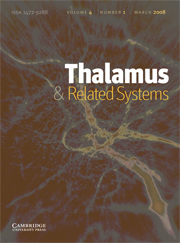Article contents
Neural basis of alertness and cognitive performance impairments during sleepiness II. Effects of 48 and 72 h of sleep deprivation on waking human regional brain activity
Published online by Cambridge University Press: 18 April 2006
Abstract
Sleep deprivation impairs alertness and cognitive performance, and these deficits suggest decreases in brain activity and function, particularly in the prefrontal cortex, a region subserving alertness, attention, and higher-order cognitive processes and in the thalamus, a subcortical structure involved in alertness and attention. To substantiate this premise, we characterized the effects of 24, 48, and 72 h of progressive sleep deprivation on brain activity by assessing regional cerebral metabolic rate for glucose (CMRglu) during complex cognitive task performance in 17 young, normal, healthy male volunteers using positron emission tomography (PET) and l8Fluoro-2-deoxyglucose (18FDG). The results of prolonged sleep deprivation, 48 and 72 h, are reported here. Compared to rested baseline (RB), global CMRglu decreased by 6% at 48 and 72 h sleep deprivation (SD) and approximated the 8% decrease seen at 24 h SD. Absolute and relative regional CMRglu decreased at 48 and 72 h SD primarily in the prefrontal and parietal cortices and in the thalamus, the same areas that showed decreases at 24 h SD. Compared to 24 h SD, relative regional CMRglu decreased further in the prefrontal cortex and dorsal thalamus at 48 and 72 h, and at 72 h SD in a limited area of medial visual cortex. Relative regional CMRglu increased in lateral superior occipital cortices, lingual and fusiform gyri, anterior cerebellum, and in primary and supplementary motor cortices at 48 and 72 h SD, indicating a rebound CMRglu activity response from 24 h SD. Polysomnographic monitoring confirmed that subjects were awake. Behavioral outcomes showed continuing decreases in alertness, cognitive performance, and saccadic velocity (a measure of oculomotor response) with prolonged sleep deprivation. Progressive decreases in relative CMRglu values in prefrontal, thalamic, and primary visual areas were correlated positively with the impairments in cognitive performance and saccadic velocity across the 72 h sleep deprivation period. Relative thalamic activity was also correlated with the alterations in alertness. The prefrontal and thalamic regions were positively correlated, suggesting that sleep deprivation impacted these areas together as a functional network.
We propose that the decreases in CMRglu induced in the prefrontal-thalamic network by prolonged sleep deprivation underlie the decline in alertness and cognitive performance and signify the brain’s involuntary progression toward sleep onset, while the increases in visual and motor areas express the brain’s exertion of voluntary control to remain awake and perform. This exertion of voluntary control is manifest in increased subject effort and physical movement, and the recruitment of additional brain regions may reflect an attempt to sustain alertness and cognitive performance despite a continuing decline in prefrontal-thalamic activity. Our findings provide support for the notion of a specific sensitivity of the prefrontal cortex to, and a pivotal role of the thalamus in, sleepiness.
Keywords
- Type
- Research Article
- Information
- Copyright
- Elsevier Science Ltd
- 62
- Cited by




